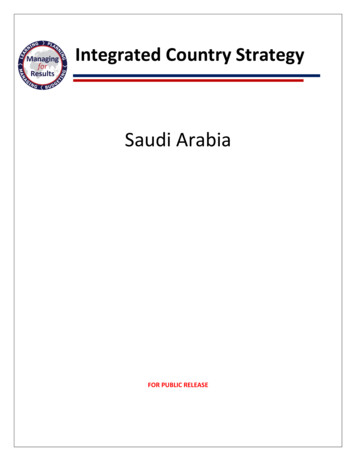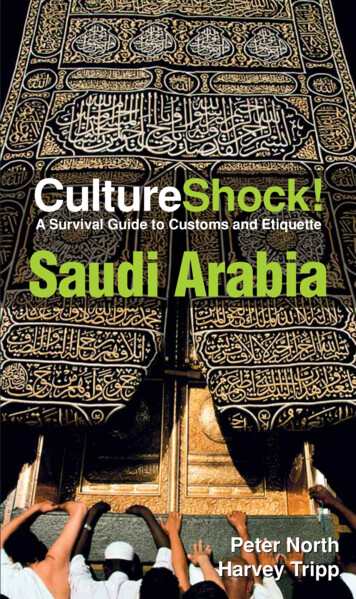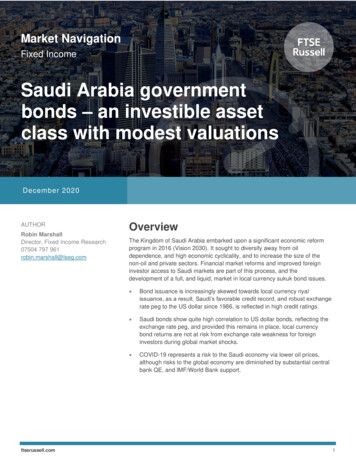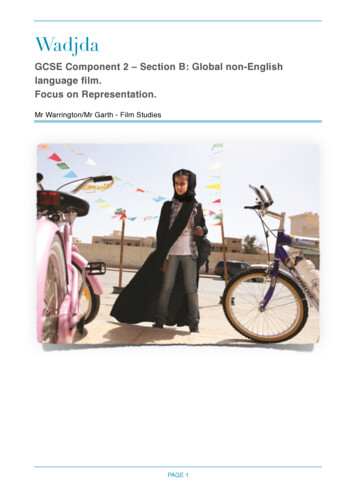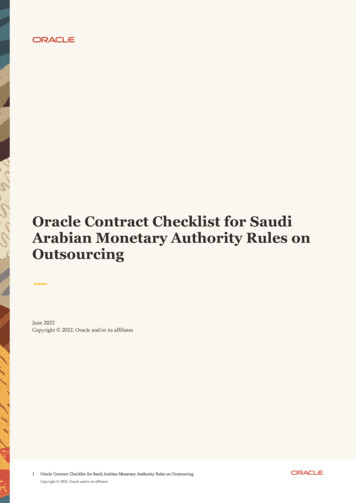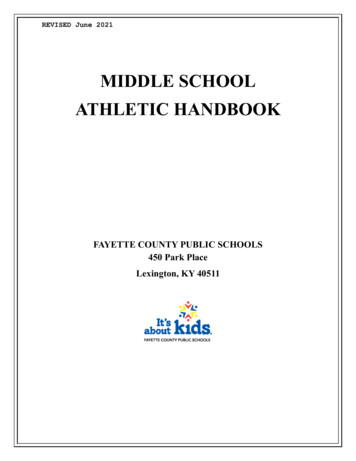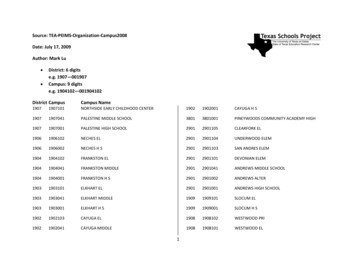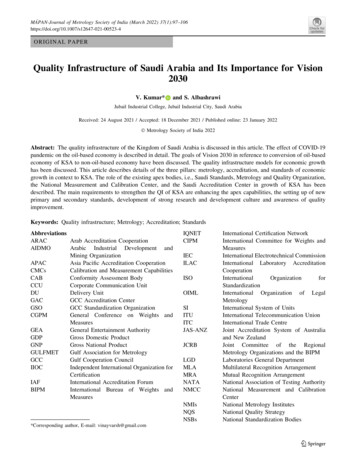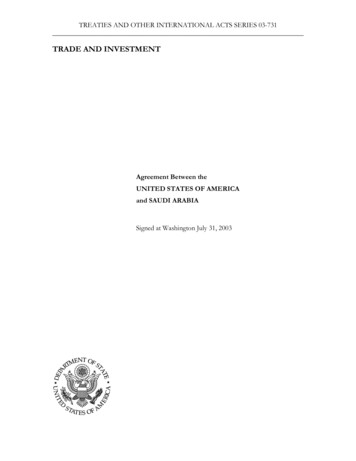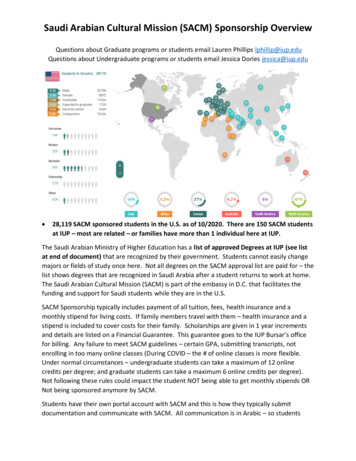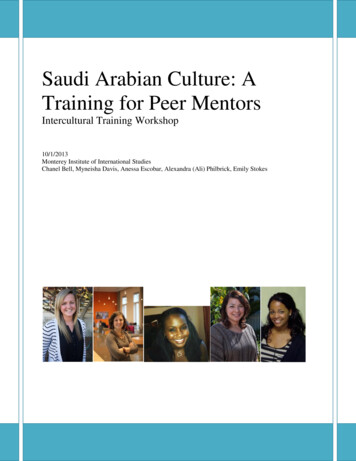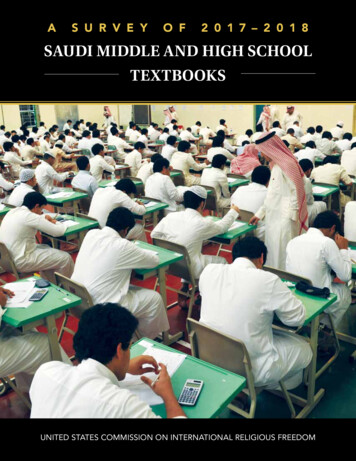
Transcription
AS U R V E YO F2 0 1 7 – 2 0 1 8SAUDI MIDDLE AND HIGH SCHOOLTEXTBOOKSUNITED STATES COMMISSION ON INTERNATIONAL RELIGIOUS FREEDOM
Cover photo: AMER HILABI/AFP/Getty Images
AS U R V E YO F2 0 1 7 – 2 0 1 8SAUDI MIDDLE AND HIGH SCHOOLTEXTBOOKSN OVE M B E R 2 018
COMMISSIONERSTenzin DorjeeChairKristina Arriaga, Vice ChairGayle Manchin, Vice ChairGary L. BauerAndy KhawajaNadine MaenzaJohnnie MooreTony PerkinsErin D. SingshinsukExecutive Director
UNITED STATES COMMISSION ON INTERNATIONAL RELIGIOUS FREEDOMWHO WE AREWHAT IS RELIGIOUS FREEDOMThe U.S. Commission on International Religious Freedom (USCIRF) is an independent, bipartisan U.S. federalgovernment commission created by the 1998 International Religious Freedom Act (IRFA) that monitors theuniversal right to freedom of religion or belief abroad.USCIRF uses international standards to monitor violations of religious freedom or belief abroad and makespolicy recommendations to the President, the Secretaryof State, and Congress. USCIRF Commissioners areappointed by the President and Congressional leadersof both political parties. The Commission’s work is supported by a professional, nonpartisan staff of regionalsubject matter experts. USCIRF is separate from theState Department, although the Department’s Ambassador-at-Large for International Religious Freedom is anon-voting, ex officio Commissioner.Inherent in religious freedom is the right to believe ornot believe as one’s conscience leads, and live out one’sbeliefs openly, peacefully, and without fear. Freedom ofreligion or belief is an expansive right that includes thefreedoms of thought, conscience, expression, association, and assembly. While religious freedom is America’s first freedom, it also is a core human right international law and treaty recognize; a necessary componentof U.S. foreign policy and America’s commitment todefending democracy and freedom globally; and a vitalelement of national security, critical to ensuring a morepeaceful, prosperous, and stable world.
Professional StaffDwight Bashir, Director of Research and PolicyElizabeth K. Cassidy, Director of International Law and PolicyIsaac Six, Director of Congressional Affairs and CommunicationsTina L. Mufford, Deputy Director of Research and PolicyRoy Haskins, Director of Finance and AdministrationFerdaouis Bagga, Policy AnalystWaris Husain, Policy AnalystJason Morton, Policy AnalystDominic Nardi, Policy AnalystScott Weiner, Policy AnalystKurt Werthmuller, Policy AnalystKeely Bakken, ResearcherAlex Iverson, ResearcherPatrick Greenwalt, ResearcherZach Udin, Research AssistantKaren Banno, Travel ManagerKirsten Lavery, International Legal SpecialistJavier Peña, Communications SpecialistHenry Young, Management and Program AnalystUNITED STATES COMMISSION ON INTERNATIONAL RELIGIOUS FREEDOM
TABLE OF CONTENTSIntroduction . . . . . . . . . . . . . . . . . . . . . . . . . . . . . . . . . . . . . . . . . . . . . . . . . . . . . . . . . 1Summary of Findings . . . . . . . . . . . . . . . . . . . . . . . . . . . . . . . . . . . . . . . . . . . . . . . . . . 3Method . . . . . . . . . . . . . . . . . . . . . . . . . . . . . . . . . . . . . . . . . . . . . . . . . . . . . . . . . . . . . 5Polytheism. . . . . . . . . . . . . . . . . . . . . . . . . . . . . . . . . . . . . . . . . . . . . . . . . . . . . . . 6Heretics . . . . . . . . . . . . . . . . . . . . . . . . . . . . . . . . . . . . . . . . . . . . . . . . . . . . . . . . . 7Apostasy. . . . . . . . . . . . . . . . . . . . . . . . . . . . . . . . . . . . . . . . . . . . . . . . . . . . . . . . . 9Shunning . . . . . . . . . . . . . . . . . . . . . . . . . . . . . . . . . . . . . . . . . . . . . . . . . . . . . . . 10Jihad. . . . . . . . . . . . . . . . . . . . . . . . . . . . . . . . . . . . . . . . . . . . . . . . . . . . . . . . . . . 12Women, Gay Men, and Illicit Sex . . . . . . . . . . . . . . . . . . . . . . . . . . . . . . . . . . . . . 14Conclusion . . . . . . . . . . . . . . . . . . . . . . . . . . . . . . . . . . . . . . . . . . . . . . . . . . . . . . . . . 15A SURVEY OF 2017-2018 SAUDI MIDDLE AND HIGH SCHOOL TEXTBOOKS
INTRODUCTIONFor more than 15 years, the U.S. Commission onInternational Religious Freedom (USCIRF) hasreviewed and analyzed content in Saudi government textbooks that were found to promote hatredand violence toward religious minorities and others.The results of this analysis have appeared in USCIRF’sannual reports and separate stand-alone reports onthe topic. Moreover, inflammatory language is notconfined to textbooks distributed within Saudi Arabia.Saudi textbooks containing such language continue tosurface in numerous countries around the world. Forexample, in 2008, USCIRF reported on passages inciting intolerance and violence in high school textbooksused at the Islamic Saudi Academy (ISA) in Alexandria, Virginia. At the time, the ISA operated under theauspices of the Saudi Embassy in Washington, DC andused some textbooks published by the Saudi Ministryof Education.For years, the Saudi government has stated publiclyand privately that it was making progress by reviewingand revising its textbooks. In July 2006, the Saudi government confirmed to the United States that, by 2008,it would revise and update its textbooks to remove alllanguage disparaging non-Muslims or promoting hatredtoward other religions and religious groups. Nevertheless, this and other subsequent deadlines were not met.Since then, USCIRF has acknowledged the Saudi government’s incremental progress in revising its textbooksthat reflect an overall trend toward greater tolerance, butefforts remain incomplete.In addition, USCIRF has consistently raised its concern in meetings with Saudi government officials duringvisits to the Kingdom in 2007, 2011, 2013, 2017, and 2018and during numerous meetings with Saudi officials inWashington, DC. In March 2018, USCIRF delivered aletter conveying concern over intolerant content in the2017-2018 textbooks to Crown Prince Mohammed binSalman during his visit to Washington, DC.In May 2018, USCIRF released a Special Report onselect high school textbooks identifying several areasof concern. This report by an independent contractorexamined textbooks from the 2017–2018 academic year.Unlike past revisions to textbooks where progress hadbeen made, these most recent texts contained severalintolerant and inflammatory passages that are cited bythe report. Overall, these textbooks represented backsliding from earlier versions that were trending towardmore tolerance and understanding.A SURVEY OF 2017-2018 SAUDI MIDDLE AND HIGH SCHOOL TEXTBOOKS1
SUMMARY OF FINDINGSThis follow-on contracted study reviews 22 middleand high school textbooks published by the Saudigovernment for the 2017-2018 academic year,including the 12 high school books previously reviewed byUSCIRF in its May 2018 Special Report. The books numbermore than 3,000 pages and primarily focus on religioussubjects. For comparison, the study also includes twomiddle school texts on social and national studies.Intolerant content is scattered throughout many ofthe books. This intolerance is reflected in the commentary and interpretations offered by the textbooks.Whereas the middle school curriculum and booksgenerally dwell on developing “right” belief, thehigh school books focus on inculcating appropriateresponses by society and the individual to those with“wrong” beliefs. They teach that those who worship differently from the Saudi state-sanctioned interpretationof Islam are polytheists who will go to hell regardlessof their good deeds. Shi’a and Sufi veneration of thegravesites of prophets is dismissed as “heresy” whilecriticism of Islam is deemed “apostasy,” for which thetextbook endorses the death penalty. The textbookscaution students to avoid friendship with members ofother religions. They also encourage both violent andnon-violent jihad against non-believers. Finally, thepassages espouse the death penalty for women whohave an affair, and for gay men.The textbooks examined in this study are moreintolerant than the six religious books from 2012–2014reviewed in a previous internal analysis by USCIRF. Theyare even more intolerant than the 2011–2012 textbooksstudied by the International Center for Religion andDiplomacy (ICRD), which identified many troubling passages. The 2017–2018 books are more akin to Saudi textbooks from the early years of the previous decade beforethe Saudi government promised to reform its curricula.A SURVEY OF 2017-2018 SAUDI MIDDLE AND HIGH SCHOOL TEXTBOOKS3
METHODTwenty-two books are included in this review. Allbut two have to do with religious studies, whichis where most of the worrisome content wasfound in previous years:Middle School Curriculum (2017–2018)Grade 1Specialized ProgramHadith 2Interpretation (Tafsir) 2Monotheism (Tawhid) 2Jurisprudence (Fiqh) 2Optional ProgramJurisprudence (Fiqh) – 1st SemesterJurisprudence (Fiqh) 3Hadith – 1st SemesterQuarterly High School Curriculum(2017–2018)Hadith – 2nd SemesterInterpretation (Tafsir) – 1st SemesterInterpretation (Tafsir) – 2nd SemesterMonotheism (Tawhid) 1 - QuarterlyMonotheism (Tawhid) – 1st SemesterQur’an Sciences (Ulum al-Qur’an) 1 - QuarterlyMonotheism (Tawhid) – 2nd SemesterJurisprudence (Fiqh) 1 - QuarterlySocial and National Studies – 1st SemesterGrade 2Jurisprudence (Fiqh) – 1st SemesterThe following discussion contains representative material arranged by theme and concludes by comparing the2017–2018 textbooks with previous textbooks from theearly 2010s.Social and National Studies – 2nd SemesterStandard High School Curriculum(2017–2018)Shared ProgramHadith 1Interpretation (Tafsir) 1Monotheism (Tawhid) 1Jurisprudence (Fiqh) 1A SURVEY OF 2017-2018 SAUDI MIDDLE AND HIGH SCHOOL TEXTBOOKS5
PolytheismOne of the principle tenets of Wahhabism is the worship of God alone. Failure to do so iscondemned as “polytheism” (shirk), worshipping something alongside God. Polytheists,according to Wahhabis, are not merely people who worship multiple gods; they are alsopeople who worship God improperly (i.e., equate a non-Islamic deity with the God ofIslam), including Jews, Christians, and even fellow believers like the Shi’a and Sufis.1In Wahhabi theology, polytheists of all stripes are destined for hell regardless oftheir good deeds. These doctrines are reflected in passages found in the middle schooltextbooks on monotheism: فإن الله تعالى ال يقبل ، “ فتوحيد الله تعالى هو أساس قبول كل عمل Belief in one God is the basis for any act to be accepted, for God does not accept كالصدقة والبر ، عمل المشركين وإن كان في ظاهره عمال صالحا the actions of polytheists even if the act is outwardly righteous, such as charity, and ونحو ذلك kind acts, etc.” (Monotheism (Middle School - Grade 1 - 1st Semester): 18) وقد حرمها الله تعالى على ، الجنة ال يدخلها إال أهل التوحيد والدليل على هذا قول الله تعالى انه من يشرك بالله فقد ، المشركين حرم الله عليه الجنة ومأواه النار وما للظالمين من انصار أن الله تعالى ال يقبل أي عمل وإن كان في ظاهره صالحا إال بالتوحيد الشرك االكبر ) يخرج من االسالم 1 ولكن من تاب منه قبل موته توبة صحيحة . ) ال يغفر لصاحبه ابدا 2 تاب الله عليه ) يحبط جميع االعمال 3 ) صاحبه خالد مخلد في النار 4“Paradise is only entered by those who believe in one God, and it is forbidden byGod for the polytheists. The evidence of this is in the verse, ‘God has forbidden paradise for whomever equates any other deity with God. His abode will be hellfire andthose oppressors will have no supporters.’” (Monotheism (Middle School - Grade1 - 1st Semester): 32)“God does not accept any action, even if it looks good on its face, unless it is accompanied by monotheism.” (Monotheism (Middle School - Grade 1 - 1st Semester): 49)“The greatest polytheism [shirk]:1) It places one outside of Islam2) One who professes it is not forgiven for it at all; but, if someone repents properlybefore he dies, God will forgive him.3) It supplants all his other actions4) He is banished forever to hellfire.” (Monotheism (Middle School - Grade 1 - 1stSemester): 75) “ ال يقبل الله تعالى مع الشرك عمال وان كان في ظاهره صالحا God does not accept any action by someone who equates other deities called God كالصدقة والبر with Him, even if the act is good on its face, such as charity or kind acts.” (Monotheism (Middle School - Grade 1 - 1st Semester): 78) حديث عبد الله بن مسعود (ر) قال سالت النبي (ص) اي الذنب اعظم عند الله؟ قال ان تجعل لله ندا وهو خلقك قلت ان ذلك لعظيم قلت ثم اي؟ قال وان تقتل ولدك تخاف ان يطعم معك قلت ثم اي؟ قال ان تزاني حليلة جارك “A hadith by Abd Allah bin Masud says, ‘I asked the Prophet what is the greatest sinin the sight of God? He said to equate any other being with God because He createdyou. Then I said, that is truly great. And what is next? He said to kill your son becauseyou cannot feed him [i.e., abortion]. Then I said what is next? He said to sleep withyour neighbor’s wife.’” (Monotheism (Middle School - Grade 1 - 1st Semester): 81) “ من مات وهو يشرك بالله تعالى شركا اكبر فهو في النار خالدا Whoever dies while still committing the greatest (kind of) polytheism is in hellfire مخلدا فيها forever.” (Monotheism (Middle School - Grade 1 - 1st Semester): 82) “ ال ينفع مع الشرك عمل صالح فمن مات وهو يشرك بالله الشرك A righteous act does not benefit [i.e., cancel out] polytheism, and so whoever dies االكبر فهو من اهل النار ولو كان من اعبد الناس while adhering to the greatest [kind of] polytheism is among the people of hell evenif he is the most worshipful of people.” (Monotheism (Middle School - Grade 1 - 1stSemester): 83) انه بالشرك قد ابتعد . “ وصف الله تعالى الشرك بانه ضالل بعيد God described polytheism as an error. Through polytheism, one is extremely عن الحق والهدى بعدا شديدا وبهذا يكون قد ابتعد عن رحمة الله remote from the truth and the light, and in this way he will be far from the mercy ومغفرته فال يرجى لصاحبه رحمة وال مغفرة of God and His forgiveness, and he will not be shown any mercy and forgiveness.”(Monotheism (Middle School - Grade 1 - 1st Semester): 84)For an overview of the Wahhabi interpretation of shirk and its political manifestations in Saudi history, see Elizabeth Sirriyeh, “Wahhabis, Unbelievers and the Problems of Exclusivism,” British Journalof Middle Eastern Studies 16.2 (1989): 123–132.16UNITED STATES COMMISSION ON INTERNATIONAL RELIGIOUS FREEDOM
HereticsThe middle school textbooks on monotheism are especially critical of Shi a and SufiMuslims for venerating the graves of their imams and saints and for seeking theirintercession with God. Wahhabis consider these practices the greatest form of polytheism, placing one outside of the faith. The textbooks reflect this perspective but donot explicitly say whether someone who engages in these practices is an apostate. نهى النبي (ص) عن اتخاذ قبره عيدا لئال يكون ذلك ذريعة ووسيلة تحريم اتخاذ قبر النبي (ص) عيدا بان . لعبادته من دون الله تعالى ان يتخذ قبره عيدا : يعتاد المجيء اليه على وجه مخصوص ومن ذلك للصالة والدعاء وغير ذلك من وسائل الشرك .“The Prophet forbade his grave from being the site of any festival lest it becomea pretext and a means to worship him aside from God. It is forbidden to use theProphet’s grave for a festival by doing things associated (with festivals) like using hisgrave for a festival for prayer and other means of polytheism [shirk].” (Monotheism(Middle School - Grade 1 - 1st Semester): 99) فاذا كان الذين اوتوا نصيبا من الكتاب يؤمنون بالجبت والطاغوت كما في االية االولى واذا كان اليهود ممن عبد الطاغوت كما في االية الثانية واذا كان في االمم السابقة من اتخذ المساجد على القبور كما في االية الثالثة فان ذلك سيكون في هذه االمة .“If there were people who received a portion of the scriptures and believed in idols,as stated in the first verse, and if the Jews were among those who worshipped idols,as in the second verse, and if there were those in previous religious communitieswho used graves as places of worship, as in the third verse, then that will happenin this religious community as well.” (Monotheism (Middle School - Grade 1 - 1stSemester): 105) االمثلة التي وقع فيها الغالة في االنبياء والصالحين كثيرة منها :( ) الغلو في النبي (ص) بدعائه او االستغائة به من دون الله تعالى 1( ) الغلو في النبي (ص) بالحلف به من دون الله تعالى 2( ) الغلو في عيسى بن مريم (ع) بجعله الها او ابن االله 3( ) الغلو في االولياء والصالحين بالبناء على قبورهم وطواف بها 4 والسجود عليها ودعائهم من دون الله عز وتقدس “There are many examples of what those who excessively venerate and exaggerate[al-ghulat] did with regard to the prophets and the righteous:1) Exaggeration regarding the Prophet by praying to him or seeking his help asidefrom God.2) Exaggeration regarding the Prophet by swearing by him and not by God.3) Exaggeration regarding Jesus by making him a god or a son of God.4) Exaggeration regarding the saints and the righteous by building structures ontheir graves, circumambulating them, prostrating on them, and praying to themwithout God, powerful and holy.” (Monotheism (Middle School - Grade 1 – 2ndSemester): 12) الغلو في آل بيت النبي (ص) برفعهم فوق مكانته التي أعطاهم الله وقد غال فيهم أناس فوقعوا في ، تعالى من أسباب الشرك بالله تعالى ، ا) دعاؤهم من دون الله تعالى : ومن صور ذلك ، الشرك بالله تعالى ب) زعم أن . وهذا شرك في األلوهية ، واالستغاثة بهم في الشدائد وهذا شرك في ، وتدبير الخالئق ، لهم القدرة على التصرف في الكون أو أنهم يعرفون ، ت) زعم أن لهم القدرة على معرفة الغيب . الربوبية وهذا شرك في األسماء والصفات ، ما سيكون إلى يوم القيامة .“Exaggeration regarding the Family of the Prophet by exalting them above thestation God gave them is one of the causes of polytheism [shirk]. People excessivelyvenerated them and fell into polytheism. Among the examples are: A) Praying tothose other than God and asking them for help during times of hardship. This is polytheism regarding God’s divinity. B) Claiming that they have the power to manipulatereality and command created things. This is polytheism regarding God’s lordship. C)Claiming that the have the ability to know the unseen realm, or that they know whatwill happen until the Day of Judgment. This is polytheism regarding the names andattributes (of God).” (Monotheism (Middle School - Grade 1 – 2nd Semester): 18) حرمت الشريعة االسالمية جميع الوسائل الؤدية الى الشرك ولو كان اتخاذ القبور مكانا يتقرب فيه : ذلك الفعل عبادة لله تعالى ومن ذلك الى الله تعالى بالصالة فقد نهت الشريعة عن ذلك اشد النهي وحذر منه الرسول الكريم .“The Islamic Shari’ah has banned all the means that lead to polytheism [shirk], evenif they include a way of worshipping God. Among them are using graves as placeswhere people get closer to God through prayer. The Shari’ah has strictly forbiddenthis, and the Noble Messenger warned against this.” (Monotheism (Middle School Grade 1 – 2nd Semester): 20) “ الذين يتخذون قبور األنبياء والصالحين مساجد هم شرار الخلق عند Those who use the graves of the prophets and the righteous as mosques are evil peo الله تعالى ple in the eyes of God.” (Monotheism (Middle School - Grade 1 – 2nd Semester): 20)A SURVEY OF 2017-2018 SAUDI MIDDLE AND HIGH SCHOOL TEXTBOOKS7
لماذا كانوا شرار الخلق عند الله تعالى؟ منها ، كان هؤالء شرار الخلق عند الله ألسباب : أن اتخاذ القبور مساجد من أعظم أسباب وقوعهم وإيقاع : األول فيكونون قد ضلوا بأنفسهم وأضلوا ، غيرهم في الشرك بالله تعالى غيرهم من حيث كان الواجب عليهم هداية أنفسهم وهداية اآلخرين . أنهم قد أدخلوا الشرك على أنفسهم من حيث يظنون أنهم : الثاني ، فهم يظنون عملهم عبادة وقربة إلى الله تعالى ، يحسنون صنعا وهذا غاية الجهل والضالل ، ويدعون إليه ، فيجتهدون فيه ويوقعونهم في الشرك ، أنهم بفعلهم هذا يلبسون على الناس : الثالث ، في حين أنهم في الصورة الخارجية يعبدون الله ، بالله تعالى وتسببوا في إضالل غيرهم فاشتبه ، فضلوا في أنفسهم ، ويدعون إليه ولو دعوهم إلى الشرك ابتداء وجهارا لم يقبلوه ، فعلهم على الجهال ، فتوصلوا إلى الشرك والدعوة إليه بطريق ظاهره اإلصالح ، منهم وباطنه اإلفساد واإلضالل . أنهم تسببوا في اتخاذ أطهر األماكن وأفضلها وهي بيوت الله : الرابع وتتخذ ، فبدل أن يذكر فيها اسم الله ، تعالى لمحادثه و اإلشراك به تسببوا أن يذكر فيها اسم ، لعبادته والتذلل له والخضوع له وتوحيده غير الله تعالى من الطواغيت . «لعن رسول الله (ص) زائرات : حديث عبد الله بن عباس (ر) قال القبور والمتخذين عليها المساجد والسرج» ولعن الذين يوقدن السرج عند القبور الن ذلك من الغلو الذي يؤدي الى تعظيمها وعبادتها 8“Why were these people evil in the eyes of God?They were the worst in the sight of God for the following reasons:1) Treat the graves as mosques, which was one of the greatest reasons they fell intopolytheism and made others do so. So they led themselves and others astraywhen they instead had an obligation to guide themselves and others.2) They introduced polytheism among themselves while they thought they weredoing good. They thought their work was actually worship and drawing closer toGod, so they strove for and prayed for it. This is a goal of ignorance and darkness.3) They are misguiding people, and they are making them fall into polytheismalthough on the outside they are worshipping God and praying to Him. They haveled themselves and others astray to polytheism. They disguise what they’re doingto the ignorant, and even if they publicly call for polytheism in the beginning andare rejected, they continue their polytheism in a way that is outwardly a reformbut is really corruption and error.4) They took some of the holiest and best places, which are the houses of God, totransgress against Him and practice polytheism. Instead of mentioning His namein these places—worshipping him, humbling themselves and submitting to Himand His oneness, they caused these sites to be places where idols rather thanthe name of God are mentioned.” (Monotheism (Middle School - Grade 1 – 2ndSemester): 21)“A hadith by Abd Allah Ibn Abbas said, ‘The Messenger of God has cursed womenwho visit the graves and whoever uses them as mosques and puts lamps on them.’He cursed those who lit lamps on them because that excess leads one to glorifyingthem and worshipping such places.” (Monotheism (Middle School - Grade 1 – 2ndSemester): 22) عقوبة المصورين وهي ، دلت األدلة الشرعية على عدة عقوبات للمصورين يوم القيامة ( فعن عائشة (ر) أن النبي ، ) أنهم أشد الناس عذابا يوم القيامة 1 «أشد الناس عذابا يوم القيامة الذين يضاهون بخلق الله : »(ص) قال ( ) أن الله تعالى يخلق يوم القيامة بعدد كل صورة صورها نفسا 2: فعن عبد الله بن عباس (ر) قال ، يعذب بها المصور في جهنم بكل ، يجعل له ، «كل مصؤر النار : سمعت رسول الله (ص) يقول نفسا فتعذبه في جهنم ، »صورة صورها .( ) ان المصور يكلف يوم القيامة ان ينضخ فيما صوره الروح وليس 3 بقادر على ذلك ولكنه تعذيب له وتعجيز .“Punishment of the person who makes imagesThe Shari’ah prooftexts indicate several punishments on the Day of Judgment forthose who make images: الرجاء الشركي رجاء غير الله تعالى فيما هو من خصائص الله تعالى وهذا : وهو شرك اكبر مخرج عن ملة االسالم امثلته ( ) رجاء المشركين الهتهم الباطلة في جلب نفع او دفع ضر 1( ) رجاء القبوريين من االولياء ان يغفروا لهم الزالت وينجوهم من 2 الملمات في الدنيا او في االخرة “Polytheistic supplication Supplicating anyone other than God for something thatis in God’s hands. This is the most deviant polytheism [shirk] putting one outside ofthe religion of Islam. Examples include:1) They are the people tortured most on the Day of Judgment .2) On the Day of Judgment, God creates a torture in hell for every image a soul hasmade .3) The one who makes images will have to breathe life into those pictures on the Dayof Judgment, and he will not be able to, but it will be a torture and punishmentfor him.’” (Monotheism (Middle School - Grade 1 – 2nd Semester): 37-8)1) The polytheists supplicating their fake gods to attract benefits and push away evil.2) The supplication of those who go to graves of saints to ask for forgiveness and tosave them from the pitfalls of life of the afterlife.” (Monotheism (Middle School Grade 1 – 2nd Semester): 63)UNITED STATES COMMISSION ON INTERNATIONAL RELIGIOUS FREEDOM
ApostasyIn classical Islamic law, apostasy from Islam is punishable by death if the apostatedoes not repent.2 The 2017 2018 high school texts endorse this penalty, including forthose who make fun of God and His Prophet. “ حد الردة هو القتل ال فرق ذلك بين الرجل والمرأة The punishment for apostasy is death. There is no distinction in that between aman and a woman.” (Jurisprudence (1): 277) “ قتل المرتد حيث إن درء مفسدة وجوده كإفساد غيره من اهله Killing the apostate, since fending off the corruption of his existence—like corrupt وولده وفتنة الناس به وتجرئتهم على الدين اولى من مصلحة بقائه ing others among his people and children, causing dissension among the people, التي فيها من المصالح and making them risk religion—is better than the benefit of him remaining .”(Jurisprudence (3), 46) “ القتل إن لم يتب Death [for the apostate] if he does not repent.” (Jurisprudence (1) - Quarterly: 137) “ المستهزئ بالله واياته ورسوله مرتد ال يقبل له اي عذر فاما ان يتوب Anyone who makes fun of God, His verses, or His Prophet is an apostate. No و اما ان يقتل كفرا excuse is acceptable from him regardless of whether he repents or is killed forinfidelity.” (Interpretation (1): 109)For an overview, see David Cook, “Apostasy from Islam: A Historical Perspective,” Jerusalem Studiesin Arabic and Islam 31 (2006): 248-288.2A SURVEY OF 2017-2018 SAUDI MIDDLE AND HIGH SCHOOL TEXTBOOKS9
ShunningA pillar of Wahhabi religious practice is the doctrine of al-wala’ wa’l-bara’, fraternizing only with true Muslims and shunning nonbelievers and misguided Muslims.The concept was elaborated in the teachings of Muhammad Ibn Abd al-Wahhab, theeponymous founder of Wahhabism, who justified violence against his fellow Muslimsby arguing that they behaved like idolaters and so should be fought until they acceptedhis beliefs. For decades, the kingdom has promoted the doctrine within its borders andoverseas. Even today, the government committee that issues fatwas proclaims on itswebsite that “hating infidels is obligatory because they are the enemies of God and Hismessenger and the enemies of Muslims.”3 Another fatwa states that any Muslim whocalls for the “unity of religions” is an apostate.4The 2017 2018 middle and high school textbooks endorse the doctrine al-wala’wa’l-bara’: “ الله تعالى ال يحب الكافرين والمسلم ال يحبهم الجل ذلك ولتكذيبهم God does not love unbelievers, and the Muslim does not love them because of that نهى الله تعالى عن مودة .) لكتاب الله تعالى ولرسوله (ص and because they denied the book of God and His Messenger.God forbade loving الكافرين . unbelievers.” (Monotheism (Middle School - Grade 1 - 2nd Semester): 53) “ مواالة المؤمنين ومعاداة الكافرين اوثق عرى االيمان Being loyal to Muslims and being the enemy of the infidels is the firmest handle offaith.” (Monotheism (1): 163)The textbooks urge Muslims to avoid befriending Jews and Christians becausethey are presumed to be hostile to Islam: ان اليهود والنصارى ال يرضيهم اال الكفر باالسالم واتباع ملتهم . “There is no satisfying the Jews and Christians except by disbelieving in Islam andfollowing their faiths.” (Interpretation (2): 78) “ بيان كيد اليهود وحرصهم على تفتيت الصف االسالمي وزعرعة Explanation of the plotting of the Jews, and their effort to divide the ranks of عقيدة المسلمين ونشر الشبهات والشهوات بينهم Islam, unsettle the dogma of Muslims, and sow doubts and base desires amongthem.” (Interpretation (2): 116)3 “ تجب معاداة الكفار؛ ألنهم أعداء الله ورسوله وأعداء المسلمين nguagename ar&lang ar&view result&fatwaNum &FatwaNumID &ID 11337&searchScope 3&SearchScopeLevels1 &SearchScopeLevels2 &highLight 1&SearchType exact&SearchMoesar false&bookID &LeftVal 0&RightVal 0&simple &SearchCriteria allwords&PagePath &siteSection 1&searchkeyword 217131217136216177217138217134#firstKeyWordFound4 “” إن الدعوة إلى (وحدة األديان) إن صدرت من مسلم فهي تعتبر ردة صريحة عن دين اإلسالم nguagename ar&lang ar&view result&fatwaNum &FatwaNumID &ID 6967&searchScope 2&SearchScopeLevels1 &SearchScopeLevels2 &highLight 1&SearchType exact&SearchMoesar false&bookID &LeftVal 0&RightVal 0&simple &SearchCriteria allwords&PagePath &siteSection 1&searchkeyword nd10UNITED STATES COMMISSION ON INTERNATIONAL RELIGIOUS FREEDOM
Nevertheless, one passage in a middle school textbook on monotheism encourages treating unbelievers kindly and with justice: “ ال يمنع بغضهم من االحسان اليهم والعدل معهم وحسن التعامل Hating them does not prevent you from being good and just toward them, treating معهم ودعوتهم الى الله تعالى وترك ظلمهم والتعدي them well, calling them to God, and not oppressing them or transgressing againstthem.” (Monotheism (Middle School - Grade 1 - 2nd Semester): 54)The passage is drawn from Qur’an 60:8: “God does not forbid you from dealingwith kindness and justice with those who did not make war against you on account ofreligion and did not expel you from your homes. Indeed God loves the just.”Another passage counsels students to judge sinners on a sliding scale, not inabsolute terms: ليس هذا بغضا مطلقا بل يحب المسلم العاصي بقدر ما فيه من This is not absolute hatred; rather, the Muslim loves the sinner to the extent of what االيمان والعمل الصالح ويبغض بقدر ما فيه من الفجور والعصيان faith and righteous action is in him, and he hates to the extent of immorality anddisobedience in him. (Monotheism (Middle School - Grade 1 - 2nd Semester): 54)Still, passages that encourage religious tolerance are rare—two were found in the3,000 pages of text studied. Their infrequency means they likely do little to amelioratethe intolerant passages.A SURVEY OF 2017-2018 SAUDI MIDDLE AND HIGH SCHOOL TEXTBOOKS11
JihadSeveral passages in the high school textbooks urge violent jihad against nonbelieversfor rejecting Islam: “ مجاهدة الكفار بدعوتهم وقتالهم Among the types of jihad are striving with the infidels by pro
ing intolerance and violence in high school textbooks used at the Islamic Saudi Academy (ISA) in Alexan - dria, Virginia. At the time, the ISA operated under the auspices of the Saudi Embassy in Washington, DC and used some textbooks published by the Saudi Ministry of Education. For years, the Saudi government has stated publicly
